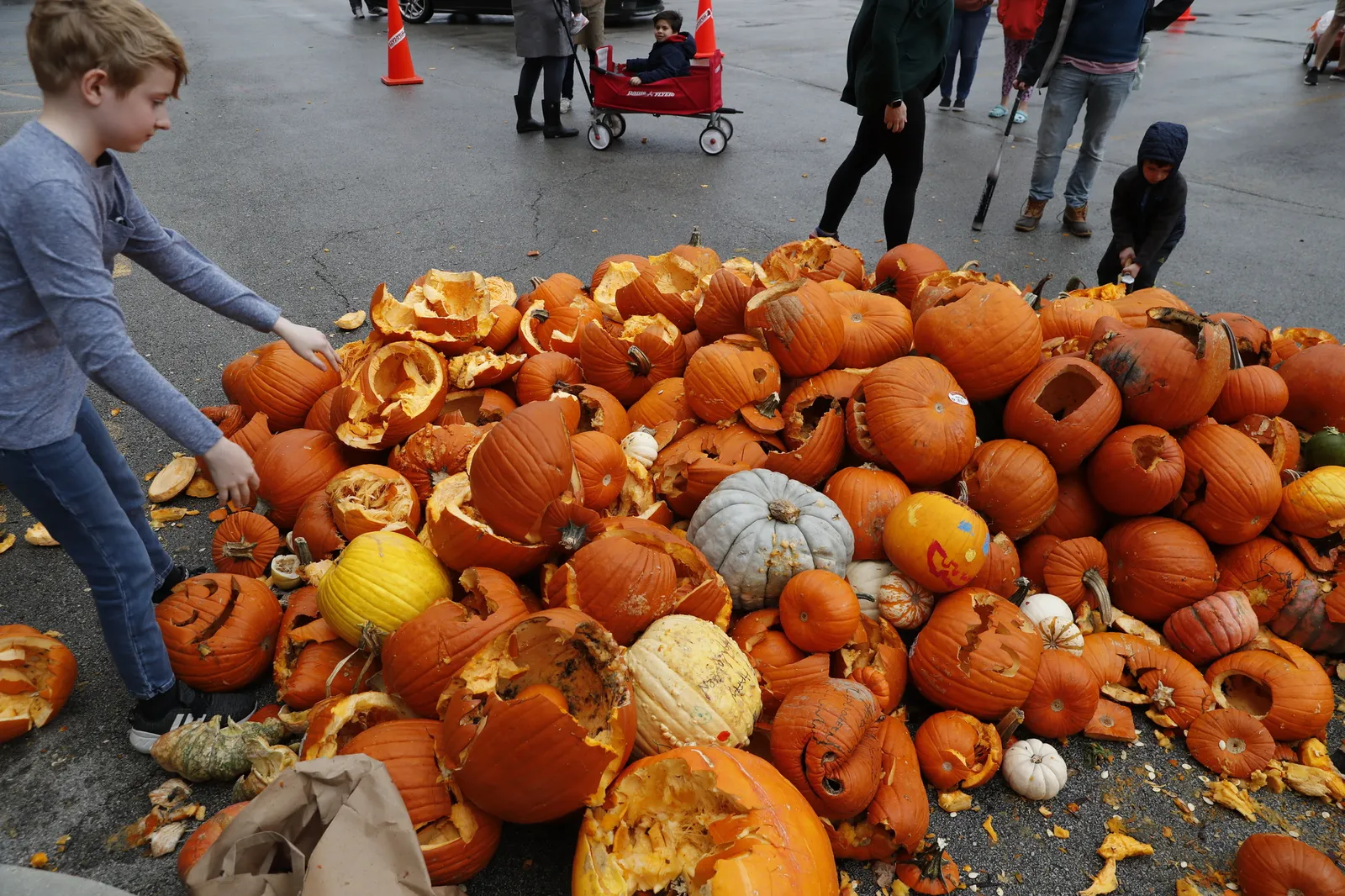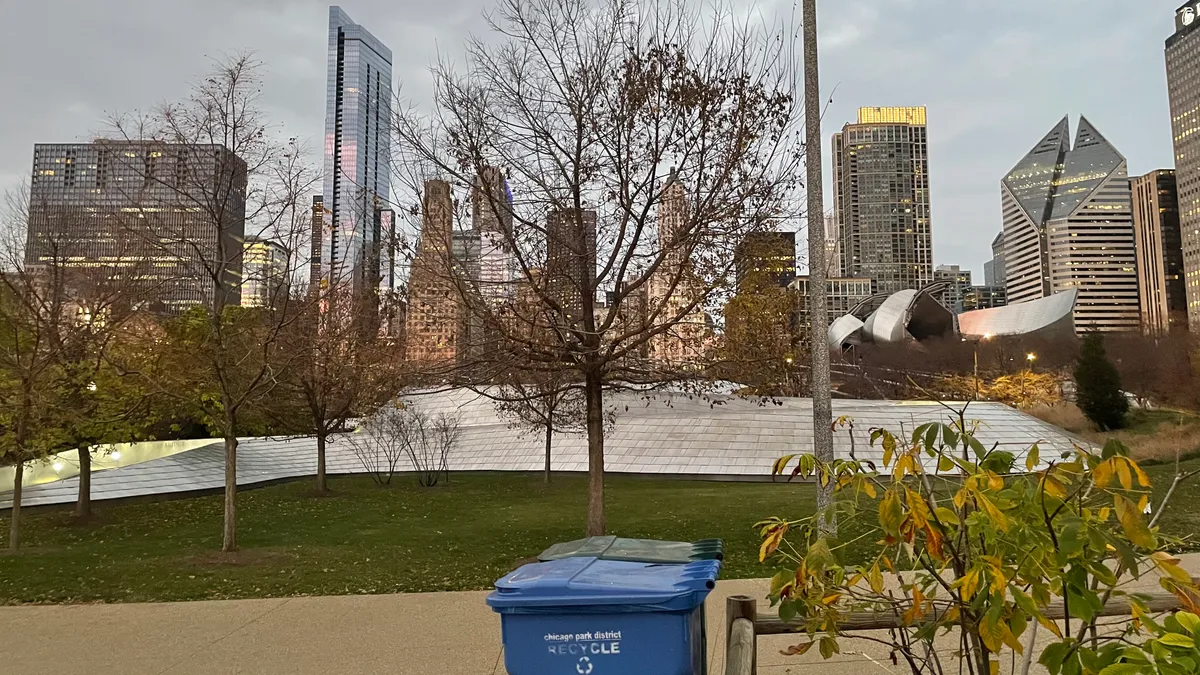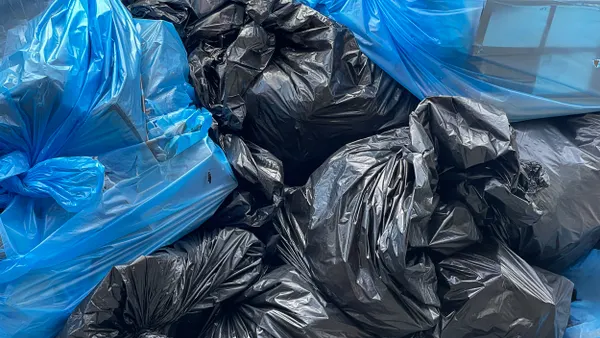When it comes to recycling performance among major cities, Chicago has long had a reputation for stagnancy. City staff and local stakeholders believe that could soon change.
Following the release of a detailed waste strategy last summer, Chicago is working to expand program staff at its Department of Streets and Sanitation and look toward new initiatives. The department touted a recent announcement about organics drop-off partnerships with community gardens, and officials are hopeful about performance improving in the city’s Blue Cart residential recycling program.
While Chicago’s July 2021 report didn’t set any specific recycling rate or waste reduction targets, it contained a dozen short-term priorities through 2022. A November 2021 update showed only partial progress, but the leader of a nonprofit that helped write the city report says change is well underway.
"We're really optimistic that there's a lot of opportunity to move forward, and we see some momentum now,” said Bill Schleizer, CEO of the Delta Institute, a nonprofit focused on environmental and economic issues in Midwestern communities. "Chicago really does have a bad reputation when it comes to waste management, but when we kind of opened it up, it became apparent that there is a lot of opportunity in the city to rethink both what it does and what the city as a whole can do."
Schleizer said Mayor Lori Lightfoot’s administration has created a new infrastructure around these issues, in part due to what it learned from the study process, and it is working to better align priorities between DSS and other agencies. The city has also advanced a major climate bond, which notes “organic waste diversion” as a potential community climate investment, and DSS has started adding new staff.
DSS Assistant Commissioner Carter O’Brien is one such hire. O’Brien started in October, following years of advocacy in leadership roles at the Chicago Recycling Coalition, and he is tasked with advancing the city’s waste strategy.

Organics recycling will be an initial focus, including recent pumpkin smash recycling events and an upcoming community garden project. DSS plans to set up composting systems at six community gardens to give local residents an option for dropping off food scraps; finished compost will then be used in the gardens. The project, done in partnership with nonprofit NeighborSpace, is funded by the city as well as a Natural Resources Defense Council grant. O’Brien described it as important from both a diversion and equity standpoint.
"There's a real benefit to a lot of these communities in Chicago,” he said, citing legacy soil pollution issues and the ability to create a local, circular organics recycling system. "If we can keep it in the city limits and get it productively woven back in, that's a much better use.”
The city’s Blue Cart program is also seen as ripe for further change. It’s available to an estimated 620,000 households across single-family homes and buildings with four units or fewer. The program had garnered a less favorable reputation in recent years due to questions about high rejection rates for carts and the effectiveness of the recycling process.
The city awarded a new contract to locally-based company LRS last year, marking a shift from prior contractors. LRS handles Blue Cart collection in four zones of the city and processes all collected Blue Cart material; DSS collects Blue Cart material in the remaining two zones and all of Chicago’s residential refuse for smaller buildings.
Schleizer described the opportunity to update contract language around contamination and data collection as an important step, along with the creation of a more structured cycle for contract renewals. DSS Commissioner Cole Stallard said during a recent budget hearing that “we are reporting significantly less blue cart contamination citywide” due to these updated procedures.
Joshua Connell, co-founder and board director at LRS, said his company has been tagging and rejecting 60% fewer carts for collection than the prior hauler did.
“The city's doing a great job. The material looks good,” said Connell. He noted that education can be a bit more complicated because of how the city’s alley network is set up, “so you don't have a direct ownership of that cart by the resident.”

Connell said the contract does not have a revenue-sharing component, and LRS carries the commodity risk, which can be challenging when markets are down, as has been the case in 2022. LRS anticipates financial benefits as it prepares to open a new MRF within the city limits in February that will process a share of the Blue Cart material with more advanced sorting equipment. Connell also believes recycling rates may continue improving by the nature of what LRS accepts.
“We can take more commodities than what [residents] were used to. We can take polypropylene, we can take aseptic containers, milk cartons, things like that, that might have been part of the residual waste stream before,” he said. “Our company has always been more aggressive, but also more creative when it comes to finding recycling solutions, at least in the Midwest.”
O’Brien said he’s heard much less about contamination concerns since LRS took over. The fact that LRS services the Chicago Public Schools district and collaborates on recycling education there, while also handling many larger multifamily buildings in the city, makes it “much easier for all of us to share effective, consistent messaging.”
Connell said if the city were to adopt weekly collection, he estimates there could be a notable increase in the recycling volumes. Such a decision would also come with financial considerations, as Chicago’s monthly collection rates are already relatively low, but one of the city’s goals is to review “appropriate Blue Cart to black cart distribution and bin size options.”
It’s too soon to know when weekly collection or any related shifts in collection policy could be viable, said O’Brien, but he’s optimistic about the city’s ability to continue making changes.
"The better you can get about reducing the waste, the more resources and time and capacity it opens up to potentially do more frequent pickup with other materials.”
The city also says it’s too soon to know if or when curbside organics recycling could be viable. In the meantime, DSS data shows that interest in yard waste service remains high. The city has received more than 10,000 service requests this year and collected at least 197 tons of material.
“I think the drop-off program will work well. I think providing [service] at the curb, or in this case at the alleys, can be tough,” said Connell, citing LRS’ experience with various organics collection programs in other markets. “It takes time, and Chicago's a big city.”
Connell and others said processing infrastructure and end markets will be key pieces of the equation. The region is expected to see more composting capacity come online along with a new anaerobic digester in the city limits.
Schleizer said his team identified public-private partnerships as an important way to accelerate development in organics processing, among other areas, and he believes that when it comes to organics, “we’re at the beginning stages of something really interesting in Chicago.”
Broader policy drivers such as a state extended producer responsibility law for packaging or a city commercial waste zone system are also identified in the report as a possible factor. Schleizer said there have been active discussions among state and local legislators, but no imminent policy actions are expected.
As Chicago works through all of these ideas — and many others related to commercial, institutional and construction waste — DSS says progress may be incremental, but it’s happening.
"The table has been set for success,” said O’Brien. “It’s a marathon, not a race.”
This story has been updated with additional statistics about Chicago’s yard waste program.












